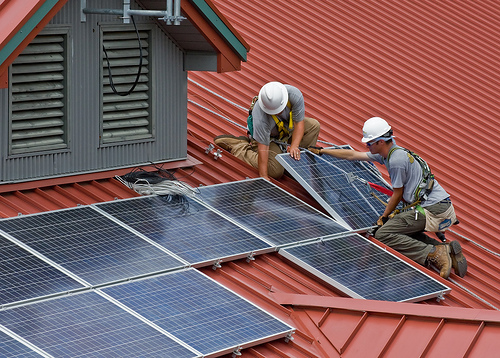Podcast: Play in new window | Download
Subscribe: RSS

The Chinese companies that cornered the world market for solar panels are now, apparently, cornered. (Photo courtesy Wayne National Forest)
Yet another much-hyped energy “renaissance” — that of the global solar-power industry — is looking less like a rebirth and more like a zombie invasion. The Chinese company Suntech, until recently the largest manufacturer of photovoltaic panels in the world (it is still number two), on Friday defaulted on over half a billion dollars worth of debt. It is the first mainland-Chinese company in history to default, and it is also the best known Chinese company in the world. It is thought that China will find a way to keep the company alive — or at least looking as if its alive — but its fall is spreading terror through the solar “industry.” Suntech and a handful of other Chinese companies have been responsible for a stunning decline in the cost of solar panels — by 60% in just the last two years. [CNN Money; Solar power has record year despite bankruptcies.] While doing so, they rose to complete dominance of the global PV market, and mired themselves in enormous debt. Suntech will not be the last of its kind to be exposed as a zombie. Also while doing so, they helped drive out of business a number of US manufacturers of solar cells. BP Solar, for example, in 2011 abandoned the largest solar-cell factory in the United States, and shortly thereafter announced it was leaving the business entirely. [Personal recollection: I pleaded with executives at the BP plant, in Frederick, Maryland, to support a seminar on distributed solar energy as a key to sustainable living. With nothing short of contempt, I was informed that they were focussed on the big picture, the large-scale solar farms, where the big profits were. Two years later, the smartest guys in the room were gone wherever smart guys go when shown to be completely wrong — the executive suite at headquarters, probably.] The drop in PV panel prices, along with some state and federal support, allowed solar installers and innovative solar companies such as SolarCity to flourish. Now, if Suntech and one or more of the other over-leveraged companies fall, the installers will not only face much harder selling ahead as prices go back up, but (as reported by Quartz) they will also be responsible for the warranties on thousands of installed panels.
The massive debt taken on by the Chinese solar companies appears to have been a deliberate decision to finance frenzied expansion in order to drive down prices worldwide, quickly, and seize the market, quickly. Now they have driven the prices, seized the market, and they are insolvent or close to it.
It’s just another demonstration of our time-honored mantra: renewables are not sustainable if they are industrial. Of course industrial processes are required to manufacture solar panels and the like, but the relentless drive for economies of scale in this as in any other industry incurs ever larger and more concentrated pools of risk, whose consequences almost always fall on the shoulders of people other than those who took the quick profits.
There are dozens and dozens of solar panel vendors. China will not let this company fail. But if they lose some business because of the media threat that they might fail, it could simply benefit other panel manufacturers including those in Taiwan, Japan, and the USA (ex. Solar World). A $1000 laptop, now $500. A $500 solar panel, now $250. I don’t see the difference. There is mismanaged inefficient economic roadkill (Gateway), and there are also innovative profitable winners (Apple). In solar there will be the same.
I agree. As soon as they get off the huge, grid-tied, mega-installations and get to work on distributed, on-site generation.